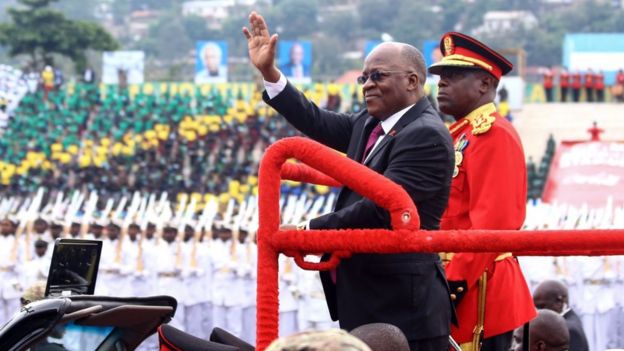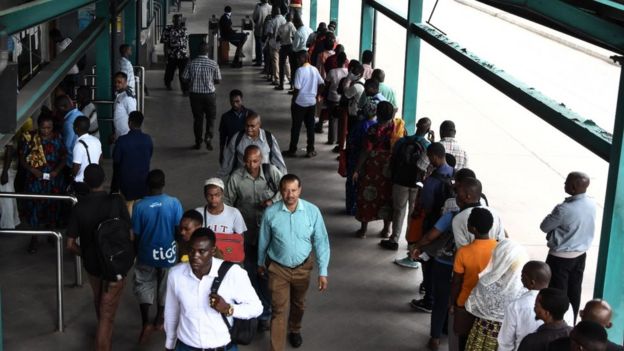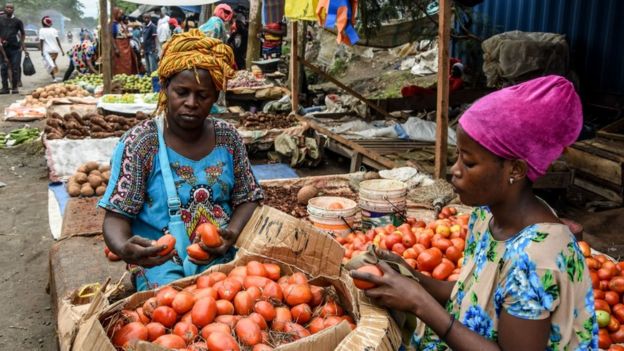Tanzanian President John Magufuli has said the number of coronavirus patients in hospitals is declining, although the government has not released data on infection rates for many weeks.
The president has repeatedly downplayed the risk of the pandemic, causing alarm among neighbouring African countries and international organisations.
The government has even urged Tanzanians to dedicate three days for thanksgiving this weekend as they say they’re beating the virus.
So what do we know about the situation in Tanzania?
Where is the data?
The main issue is that there’s been no official data on the coronavirus for weeks, and there are concerns that the authorities are trying to downplay the extent of the outbreak.
Doctors and healthcare professionals are afraid to speak out about coronavirus because of a climate of fear.
“Tanzania has always had very repressive laws against freedom of expression and the press,” says Roland Ebole, a regional researcher at Amnesty International.
“We are now seeing these laws being used in a more intensive way to target those who are speaking out, especially about Covid-19,” says Mr Ebole.
The government stopped releasing daily updates on the number of positive cases in April, with the president saying they were creating panic.
The Africa Centres for Disease Control and Prevention has “strongly” called on Tanzania to release its latest data on the outbreak.
The last figures, published on 29 April, reported 480 cases and 21 deaths (its island territory Zanzibar has since added 29 more cases in May).

President Magufuli has now provided limited data on patients with Covid-19 admitted to hospitals and health centres.
He says the number of patients in two large hospitals in the commercial capital, Dar es Salaam, has dropped from 228 to 18, although he didn’t give a timeframe for these figures. He also gave figures for a few other hospitals around the country.
It’s not possible to verify this data, or obtain numbers for wider infections and death rates across the country, and calls for greater transparency have been ignored.
And earlier this month, the US embassy in Tanzania issued an alert warning that many hospitals in the city had been “overwhelmed” in recent weeks.
“The risk of contracting Covid-19 in Dar es Salaam is extremely high. Despite limited official reports, all evidence points to exponential growth of the epidemic in Dar and other locations in Tanzania,” the alert said.
Tanzania’s neighbours increasingly concerned
The transmission of the virus across Tanzania’s borders is of particular concern to its neighbours.

These routes are heavily used for transporting goods across the region and the fear is that lorry drivers and other travellers are spreading the virus.
Testing is being carried out on people travelling out of Tanzania and into Kenya, Zambia and Uganda (and in some cases being sent back if they’re positive).
Zambia’s Nakonde district, which is just south of the border with Tanzania, has experienced by far the most cases in the country, higher than the country’s capital, Lusaka.
There is a major trading route that passes through this region, delivering goods from Tanzania’s ports into Zambia, which is landlocked.
Daily #COVID19 update: in the last 24 hrs, #Zambia recorded 11 new cases out of 644 tests. Cases are from Chirundu (4), Nakonde (3), Solwezi (1), Kasama (1), Isoka(1) and Mungwi (1). Cases include truck driver, persons with history of travel to Nakonde and routine/mass testing pic.twitter.com/NybxsGdl24
— Zambia National Public Health Institute (@ZMPublicHealth) May 19, 2020

There is a similar situation in Kenya – officials are testing lorry drivers before they are allowed into the country.
So far this month, more than 100 people arriving from Tanzania have tested positive for coronavirus and been sent back.
Kenyan President Uhuru Kenyatta said on 16 May that 29 people with a recent history of travel to Tanzania had tested positive in the preceding week.

At Ugandan border testing points, at least 15 Tanzanian lorry drivers have tested positive this month.
Government under pressure
The government says it is concerned about the economic impact of a lockdown and its effect on its vital tourism industry.
It’s also said that tests have been faulty, with samples of a fruit and a goat testing positive.
But there is growing dismay with Mr Magufuli and his resistance to following the advice of international experts.
Credit: Source link